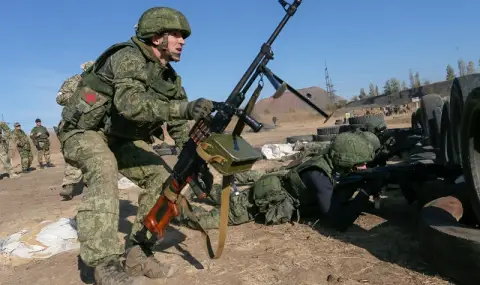Alexander came home and killed his wife in front of the eyes of their own children. This case is far from isolated: it is estimated that up to a quarter of Russians who fought in Ukraine suffer from post-traumatic stress disorder.
A rehabilitation program for Russian soldiers who fought on the battlefields in Ukraine and suffer from post-traumatic stress disorder (PTSD) has been launched in Russia. However, the authorities admit that it cannot cover all those in need, and many of them refuse help anyway.
"Sudden outburst of aggression that I could not control"
Returners from the war in Ukraine often commit crimes under the influence of alcohol. Such is the case with Sergeant Stanislav Yonkin, who last year decided to celebrate in a local nightclub when he was put on garrison leave. There he fired a flare that caused a fire that claimed the lives of 13 people.
The return home of 44-year-old Alexander Mamaev from the city of Zavolzhie also ended in tragedy: under the influence of alcohol, the soldier killed his wife in front of their own children, because he thought that his wife wanted to take the money from his pocket . Before the court, acquaintances of the accused testified that before joining the war in Ukraine, Mamaev was a calm person who "wouldn't hurt a fly.
The criminal chronicle is also full of crimes committed by former fighters of the private army "Wagner". According to calculations of the edition "Verstka" participants in the war in Ukraine committed at least 190 crimes in two years, of which 55 were murders. Most of the perpetrators were intoxicated and later explained their behavior as a sudden outburst of aggression that they could not control. Psychologists claim that uncontrollable aggression is one of the manifestations of post-traumatic stress disorder.
One of the most common problems that servicemen talk about on social media: nightmares and flashbacks. "At the front, you think everything is fine. But then you come back to civilian life and realize how different everything is. You understand that something has changed in you," says a Russian who participated in the war against Ukraine.
This can also be signed by Svetlana, who after two years of war in Ukraine can no longer recognize her boyfriend. Before he went to the front, he was a chatty jovial man, but the war turned him into a closed and even aggressive personality. If before they heard each other regularly and talked for a long time on the phone, lately he answered her messages in monosyllables. They had a baby girl this year, but Svetlana's 23-year-old boyfriend didn't even come to see them when he was put on leave. He once said horrible things to her, including about the child, and then wrote her an apologetic message saying he was "just mad".
According to a study of the Research Center "V. M. Bekhterev" between 3 and 11% of servicemen develop post-traumatic stress disorder. And the Russian Ministry of Health claims that last year a total of 11,000 Russian servicemen who participated in the war in Ukraine sought professional help from psychologists. Most of them were released from military service for health reasons or because of the death of a relative.
People with post-traumatic stress are also returning to the front
But there are also soldiers diagnosed with PTSD who nevertheless return to the front. This is the case with 25-year-old Alexander Strebkov - despite the doctors' conclusion that he should not be entrusted with a weapon, the soldier was returned to the combat zone.
In large-scale military conflicts such as Russia's invasion of Ukraine, a mental disorder may develop and significantly more than those quoted by the "Bekhterev" Center. between 3 and 11 percent of military personnel. According to research published on the website of the US Department of Veterans Affairs, cases of post-traumatic stress disorder can reach up to 29% - depending on the scale of the conflict. Against this background, Russian psychotherapists warn that the number of crimes in Russia committed by former participants in the war against Ukraine who have developed post-traumatic stress disorder may increase significantly.
Lack of treatment can also lead to secondary disorders resulting in addiction to alcohol or psychoactive substances, experts say. According to them, the consequences of this are most severe for the family. For example, the children of servicemen who have returned from the front with PTSD often end up with a deformed psyche.
